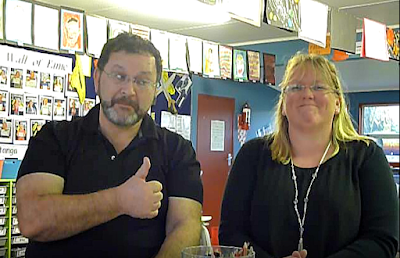Week 16 - DIGITAL - Sensors and Sensibility
Station rotation - fixed schedule
This week there will be four activities for you to complete in groups
- Establishing your community of practice
- Mobile sensor inquiry activity
- Brain sensing
- Student feedback (first 16 weeks)
This is a fixed-schedule station rotation. Each group will be allocated 15 minutes for each station in a specific order.
STATION 1: Establishing your community of practice
First read the one-pager about Online learning and then
- Find a study buddy or a study group (can be f2f or virtual)
- When and where are you going to meet?
- Record your plan by using an appropriate tool
- Share the plan, documents and/or contact details
In doing so, reflect on the following:
- How might you actively find further peers for your study group.
- How might you work collaboratively on the second part of the course? Maybe creating your own FB or G+ group might help you have discussions and share ideas? Or maybe you could have Weekly Google+ hangouts or Skype meetings? Or maybe there are teachers that live or work close to you who you could meet with in a cafeteria (with a Wifi connection) to work over a drink? Maybe you can schedule meetups using Doodle?
- How do you make sure you have the grit and perseverance needed for online learning?
- How do you manage your time and gain knowledge while online?
- How do you create and maintain an online identity?
- Now you’ve come to the class each week, how do you remember to go online?
- What do you want your physical environment to be like? Even if you study online, you are in a physical space of your choice.
STATION 2: Sensor-based inquiry
The increasing number of sensors available on mobile devices is opening up new avenues for inquiry-based activities that capture data from the environment. “On the opportunity side, many mobile devices are equipped with a vast array of sensors and versatile components (e.g., camera, microphone, speaker, Bluetooth, Wi-Fi), that opens the door to curricular modules that make clever use of this technology to showcase computing concepts in new ways that are more effective and more engaging.” (Dabney, Dean & Rogers, 2013).
Most mobile devices now have built-in sensors for motion, position and environment. These can be applied in many different ways. "For example, a game might track readings from a device's gravity sensor to infer complex user gestures and motions, such as tilt, shake, rotation, or swing. Likewise, a weather application might use a device's temperature sensor and humidity sensor to calculate and report the dewpoint, or a travel application might use the geomagnetic field sensor and accelerometer to report a compass bearing." (Android Developers, n.d.)
Your smartphone probably has a range of sensors that you are not even aware of. Can you find a decibel meter? You can look at the Sense-it app if you have an Android phone, or check the app store for what types of sensor apps can be downloaded onto an iPhone.
Join the nQuire website and look at the existing Sense-it missions. Using a decibel meter on your mobile device, record your learning space’s noise data to the Noise Map mission
STATION 3: Brain Sensing Activity
We will be trying out the brain sensing devices provided by from ThoughtWired. The Neorsky headsets we use have many apps available for download. We use the Brainwave Visualizer in our sessions.
“The combination of educational data mining and brain sensing techniques has the potential to facilitate the detection of critical cognitive and motivational states during use of an online learning environment” (Keating, Walker, Motupali & Solovey, 2016).
Thought-Wired are offering 10% off the Neurosky Brainwave Starter Kit for the Mind Lab students
- Use the link https://shop.thought-wired.com/collections/mindlab
- Use the code MINDLAB2017S3 at checkout
STATION 4: Student Feedback
This feedback is for the first two courses of the Postgraduate Certificate in Applied Practice programme at The Mind Lab by Unitec: Digital & Collaborative Learning in Context and Leadership in Digital & Collaborative Learning.
The questionnaire is divided into five parts - Demographics, Content, Assessment, Teaching and Learning Support.
Please fill in the optional free text feedback questions if you have any specific responses. Your feedback is golden!
Student Feedback Form for Weeks 1-16: tinyurl.com/TMLJuly17Week16
And if you have time, a Problem Solving Test from the New York Times (Leonhardt, 2015): tinyurl.com/TMLProblemSolving
References
Android Developers. (n.d.) Sensors Overview. Retrieved from: https://developer.android.com/guide/topics/sensors/sensors_overview.html
Dabney, M. H., Dean, B. C. & Rogers, T. (2013, March). No sensor left behind: enriching computing education with mobile devices. In Proceedings of the 44th ACM technical symposium on Computer science education (pp. 627-632). ACM.
Keating, S., Walker, E., Motupali, A. & Solovey, E. (2016). Toward Real-time Brain Sensing for Learning Assessment: Building a Rich Dataset. Proceedings CHI ‘16.
Leonhardt, D. (2015, July 2nd). A Quick Puzzle to Test Your Problem Solving. New York Times. Retrieved from https://www.nytimes.com/interactive/2015/07/03/upshot/a-quick-puzzle-to-test-your-problem-solving.html


No comments:
Post a Comment